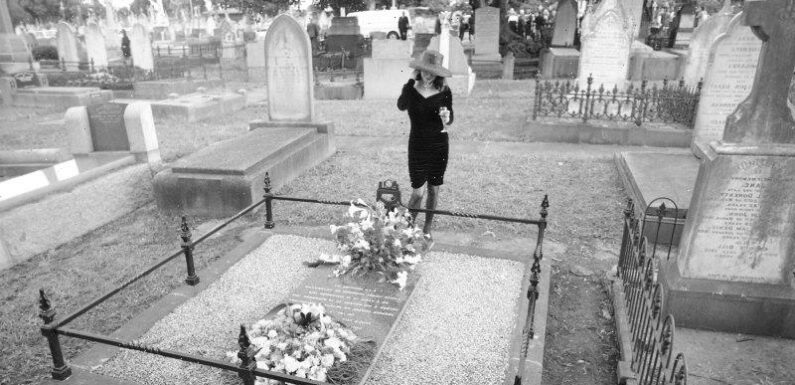
First published in The Age on December 7, 1992
Toast to a love that was shunned by Government House
There aren’t many love stories from colonial Victoria. One of them came to life vividly when retold at the weekend. It concerns a Frenchman buried in 1858 in the Melbourne General Cemetery.
In loving memory, Alison Waters, a Melbourne publisher and Francophile pays her respects to Lionel, Comte de Chabrillan in 1992.Credit:The Age Archives
On Saturday the scene at the graveside was remarkable. A string quartet played, and a crowd sipped champagne as they heard the story and honoured the man who had lived it. At the end, everyone sang ‘La Marseillaise’. It was like being at a party.
The Frenchman’s name was a mouthful: Comte Paul-Josselin-Lionel de Gulgues de Moreton de Chabrillan. He was born in 1818, and began a career as a diplomat. In 1848, in the Cafe Anglais in Paris, he met and danced with a dark-eyed prostitute named Celeste Venard. Later, Celeste wrote: “He held me close to him. I felt his heart beat. I closed my eyes and let him lead me on. I felt a rare flash of happiness.”
Having fallen into a dissolute life and lost his fortune by gambling, the comte came to Victoria in 1851 to try his luck as a gold miner. The next year, he was appointed to Melbourne as honorary French consul, second class. In 1854, he returned to France, where Celeste, known as La Mogador, was a courtesan and a star of the Bal Mabille and the Hippodrome. Despite his family’s objections, he married her.
Here, then, was a handsome aristocrat and an intelligent woman, whose arms were said to be the most beautiful in Paris. They were in love and setting out together to an exciting land called Australia. It was a new start. Nobody in Victoria knew the history of the Comtesse Celeste de Chabrillan.
Ah, but they did. Celeste had that year published five volumes of notorious memoirs called ‘Adieux au Monde’, and her reputation had beaten her to Melbourne. She should have been honoured as a diplomat’s wife, but Government House cut her dead, and the rest of Melbourne society did the same.
The comte moved at will among his countrymen in Victoria, to the goldfields, to mansions, to prison cells, building a reputation for his help and concern. His support for Celeste did not waver, but she was isolated as a mere observer.
She put up with this for two years, then returned to Paris to begin a literary career. The comte managed to make one trip home to see her, but he died in 1858. Almost his last act was to rise from his deathbed and plead with the Governor to spare the life of a Frenchman under sentence of death. To Celeste he wrote: “Do not forget me. I adore you and dream only of you.”
When the comte died, Melbourne gave him a memorable funeral at which miners clung to rooftops or climbed trees to glimpse the hearse moving slowly through a vast crowd. Women wept and threw flowers and bouquets under the horses’ feet. Military drums veiled in crepe led the funeral march. Cannon shots rang out.
At the Melbourne General Cemetery the comte’s grave deteriorated, but it has been restored through the efforts of various people, Alliance Francaise de Melbourne and the Institute for the Study of French-Australian Relations. At Saturday’s ceremony to honour the comte’s spirit and to celebrate the restoration, the French consul-general, Ms Isabelle Costa de Beauregard, said the French Government would maintain the grave from now on.
Le Meridian restaurant in Collins Street gave Saturday’s guests a lunch that recreated some of the dishes the comte and Celeste would have eaten at the Cafe Anglais in Paris.
Celeste published ‘The Goldfields’ in 1858, an unsentimental look at the Victoria she had known. In all, she wrote 12 novels, 21 plays, seven operettas, and poems and songs. To her dying day, in 1906, she wore the black of mourning.
On Saturday, the letter that broke the news to her of the comte’s death was read to the onlookers. It was so moving it was heard in silence, which persisted for a few seconds afterwards. Everything was absolutely still. Then a mighty thunderclap startled the crowd and a single bolt of lightning lit the sky.
I wish I knew how the Alliance Francaise people managed it.
Most Viewed in National
From our partners
Source: Read Full Article
